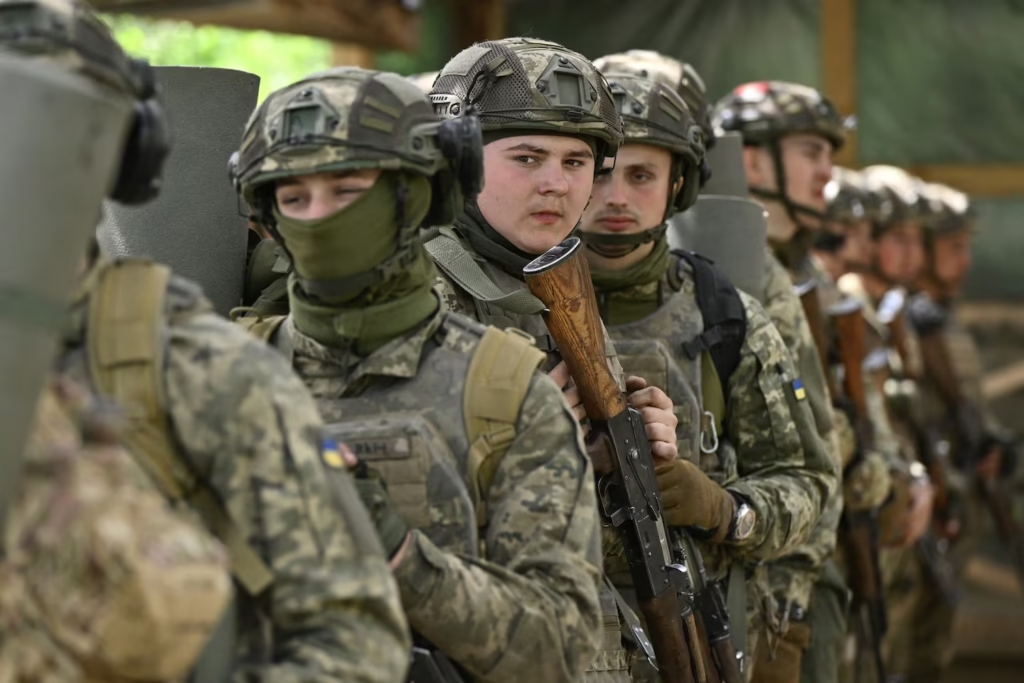On Sunday morning, President Donald Trump suggested that a breakthrough in peace talks between Russia and Ukraine could be on the horizon. In a post on his social media platform Truth Social, Trump hinted at “a potentially great day for Russia and Ukraine” and emphasized the importance of ending the devastating war that has claimed hundreds of thousands of lives and continues to disrupt both countries. The president’s message came amid ongoing diplomatic efforts to resolve the three-year conflict that has left the international community in turmoil.
“Think of the hundreds of thousands of lives that will be saved as this never-ending ‘bloodbath’ hopefully comes to an end,” Trump wrote. “It will be a whole new, and much better, WORLD.” He continued by expressing his determination to work with both sides, adding, “I will continue to work with both sides to make sure that it happens.”
Despite the president’s optimism, his recent efforts to bring peace have yet to yield tangible results. Since his return to office in January, the fighting between Russian and Ukrainian forces has continued with little sign of a lasting ceasefire or diplomatic breakthrough. Both President Volodymyr Zelenskyy of Ukraine and President Vladimir Putin of Russia have maintained firm stances, leaving the prospect of peace uncertain. The situation remains dire, with ongoing long-range strikes, casualties, and damage on both sides of the conflict.
Trump’s remarks were made in the context of a fragile diplomatic moment following recent developments related to Russia’s unilateral ceasefire proposal. On Friday, Russian President Putin had announced a three-day ceasefire during Russia’s Victory Day celebrations, commemorating the Soviet Union’s defeat of Nazi Germany in 1945. The ceasefire was meant to mark a significant moment of national pride and reflection in Russia. However, Ukraine did not agree to the ceasefire, and Ukrainian officials quickly reported violations of the pause in fighting by Russian forces.
“Victory Day is one of the most important holidays in Russia, but it came with the tragic backdrop of a continued war,” a Ukrainian spokesperson said. “Russian forces did not abide by their own ceasefire and continued attacks on Ukrainian cities.” Despite these violations, Putin’s ceasefire plan ended on Saturday, leaving the situation largely unchanged.
In contrast, President Zelenskyy has remained committed to finding a solution and took steps to initiate peace talks by offering a more ambitious ceasefire proposal. Zelenskyy suggested a complete and unconditional 30-day ceasefire, which he announced during a meeting with the leaders of the United Kingdom, France, Germany, and Poland in Kyiv on Sunday. The proposal was meant to provide a window for negotiations and a potential end to the violence that has devastated Ukraine.
In a Telegram post on Sunday, Zelenskyy shared details of his offer: “We agreed that a complete and unconditional ceasefire should begin on May 12.” This offer, he said, was a step toward bringing peace and preventing further bloodshed. Ukraine’s president noted that both sides needed to demonstrate a commitment to de-escalation, with a specific focus on ensuring that military action ceased entirely, at least temporarily, for the ceasefire to be meaningful.
While Zelenskyy’s offer was met with optimism in Ukraine and among its allies, Russia’s response to the proposal has been cautious. Putin did not immediately agree to the 30-day ceasefire and instead proposed direct negotiations between Russia and Ukraine in Istanbul on Thursday. The Russian president’s statement included a call for the resumption of talks that had been suspended in the past, suggesting that “there is fighting going on right now, a war, and we are proposing to resume the negotiations that were interrupted not by us.”
Putin’s proposal reflects his desire for dialogue, but it also reinforces his view that Ukraine must make significant concessions for peace to be achieved. He emphasized that “those who truly want peace cannot fail to support this,” though the details of what those negotiations would entail remain unclear. In essence, the Russian president’s comments indicated that he was open to talks, but without agreeing to the terms outlined by Ukraine.
Zelenskyy responded to Putin’s remarks with cautious optimism. He stated that Putin’s offer to resume talks was a positive sign, acknowledging that “the very first step in the real end of any war is a ceasefire.” Zelenskyy added that a lasting and reliable ceasefire was essential, emphasizing the importance of stopping the killing immediately, even for just one day. “There is no point in continuing the killings,” he said, signaling Ukraine’s readiness to meet with Russian officials to discuss the terms of the ceasefire and future negotiations.
Despite the desire for peace, the situation remains volatile, and the prospect of a long-term resolution to the conflict seems distant. Both sides have entrenched positions, with Russia demanding Ukraine’s recognition of its territorial gains, while Ukraine insists on the withdrawal of Russian forces from its territory and the return of the occupied regions. The war has caused untold suffering, with thousands of civilians killed, millions displaced, and significant destruction to infrastructure on both sides.
The international community continues to monitor the situation closely, and many world leaders have urged for a ceasefire and diplomatic negotiations. The United States, European Union, and NATO have expressed support for Ukraine’s territorial integrity and sovereignty, while also calling for a peaceful resolution to the conflict. However, the lack of a clear path forward and the growing humanitarian crisis have made it increasingly difficult to find common ground.
Trump’s involvement in the peace process, as well as his calls for diplomacy, have raised questions about the role of the U.S. in global peace negotiations. While he has expressed frustration with the failure of his peace efforts, his continued engagement in the process suggests that he remains committed to trying to broker a resolution. Whether or not his involvement can influence the outcome remains uncertain, as the dynamics of the Russia-Ukraine conflict are shaped by a complex mix of historical grievances, geopolitical considerations, and domestic pressures on both sides.
The possibility of a breakthrough remains elusive, but the willingness of both Zelenskyy and Putin to engage in dialogue, even if under different conditions, is a sign of hope. The coming days and weeks will be crucial in determining whether a lasting peace agreement can be reached. For now, the world watches and waits, hoping that the efforts of leaders and diplomats can bring an end to one of the most devastating conflicts of the 21st century.
As the situation unfolds, the resilience of the Ukrainian people continues to inspire the world. Despite the challenges, Ukraine remains determined to defend its sovereignty, while the international community continues to call for an end to the bloodshed and a negotiated settlement that ensures peace and stability in the region.


